

Dedicated Treatment Center
At Dedicato Treatment Center our mission is to provide responsible and comprehensive substance abuse treatment that will enhance our patient’s ability to achieve optimal mental health and recovery from chemical dependency.
How to Identify Triggers and Avoid Relapse. How to Identify Triggers and Avoid Relapse Relapse is undesirable, yet very common among those in their first year following completion of addiction treatment.

However, relapse can be prevented by knowing how to identify triggers. What Are Triggers? A trigger is something that makes you feel like returning to the misuse of alcohol or drugs. Triggers can be mental, emotional, physical, and environmental, and not everyone’s triggers will be the same. Some physical symptoms can include a tight stomach and increased heart rate.
Can a Trigger Cause Relapse? Yes; a trigger can definitely cause relapse. Relapse Stages and Symptoms Before you can avoid relapse, it’s vital to understand how it happens. Emotional Relapse During this initial phase, you may not be thinking about using a substance at all. How to Stage an Intervention. How to Stage an Intervention Staging an intervention is one option for those wishing to help a loved one struggling with substance addiction.
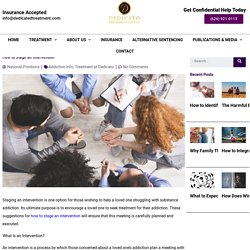
Its ultimate purpose is to encourage a loved one to seek treatment for their addiction. These suggestions for how to stage an intervention will ensure that this meeting is carefully planned and executed. What Is an Intervention? An intervention is a process by which those concerned about a loved one’s addiction plan a meeting with them to provide them with the opportunity to change their behavior via rehabilitation. Interventions are typically decided on when an individual is in denial about their addiction, or they’re either reluctant or totally opposed to getting treatment. 7 Signs Your Loved One Is Using Drugs Again. How to Integrate Recovery Strategies into Life Outside of Rehab.
How to Integrate Recovery Strategies into Life Outside of Rehab A successful recovery treatment program is the first step to breaking free from addiction.
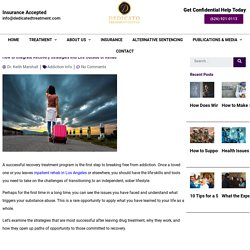
Once a loved one or you leaves inpatient rehab in Los Angeles or elsewhere, you should have the life-skills and tools you need to take on the challenges of transitioning to an independent, sober lifestyle. Perhaps for the first time in a long time, you can see the issues you have faced and understand what triggers your substance abuse. Health Issues Caused by Alcohol and Drug Addiction. Health Issues Caused by Alcohol and Drug Addiction Alcohol or drug addiction has wide-ranging impacts on the body and all of its functional systems, causing specific health problems and mental disorders, as well as changing how the entire body regulates things like appetite and body temperature.
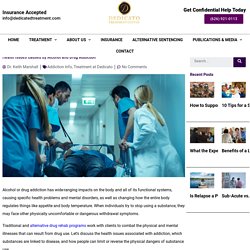
When individuals try to stop using a substance, they may face other physically uncomfortable or dangerous withdrawal symptoms. Traditional and alternative drug rehab programs work with clients to combat the physical and mental illnesses that can result from drug use. Let’s discuss the health issues associated with addiction, which substances are linked to disease, and how people can limit or reverse the physical dangers of substance use.
The Whole Body or Global Effect In addition to specific diseases involving multiple body systems, substance abuse affects the entire person. Catching or Transmitting an Infectious Disease Another immediate risk that grows over time is the risk of infection. How to Support Loved Ones in Recovery Through the Holiday Season. How to Support Loved Ones in Recovery Through the Holiday Season The holidays offer rare opportunities to come together in joy and celebration and can create unique stressors that we all feel as we schedule family gatherings and holiday parties.
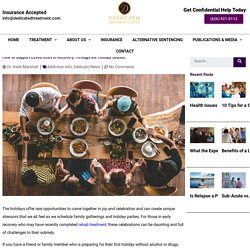
For those in early recovery who may have recently completed rehab treatment, these celebrations can be daunting and full of challenges to their sobriety. If you have a friend or family member who is preparing for their first holiday without alcohol or drugs, there are meaningful steps you can take to support them during this time and repair or restore strong bonds of caring and fellowship in the spirit of the season.
It is normal to feel some uncertainty about how to help or to worry about the consequences of a relapse, but there are ways you can make this transition easier for those you care about. How Powerful, Mean, and Blinding “Stereotyping” Can Be. 24 Years of Drug Addiction to Becoming a Doctor, CEO and Public Speaker. Cultural Competence Within the Drug and Alcohol Treatment Setting Part 2. Cultural Competence Within the Drug and Alcohol Treatment Setting Part 3. Benefits of a Long-Term Addiction Treatment Program.
Benefits of a Long-Term Addiction Treatment Program Addiction causes changes in the chemical balance of the body and brain, which over time impacts how we think, feel, and behave.
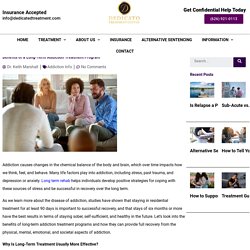
Many life factors play into addiction, including stress, past trauma, and depression or anxiety. Long term rehab helps individuals develop positive strategies for coping with these sources of stress and be successful in recovery over the long term. As we learn more about the disease of addiction, studies have shown that staying in residential treatment for at least 90 days is important to successful recovery, and that stays of six months or more have the best results in terms of staying sober, self-sufficient, and healthy in the future. Let’s look into the benefits of long-term addiction treatment programs and how they can provide full recovery from the physical, mental, emotional, and societal aspects of addiction. Why Is Long-Term Treatment Usually More Effective? Support Beyond Detox Recent Posts Sub-Acute vs. Cultural Competence Within the Drug and Alcohol Treatment Setting Part 1.
From Homeless Addict to Doctor, CEO and Public Speaker. Treatment Guide to the Most Common Co-Occurring Disorders. Treatment Guide to the Most Common Co-Occurring Disorders Many individuals are challenged with more than one physical or mental health disorder simultaneously.

When one of these conditions is the addiction to drugs or alcohol, the other(s) are considered co-occurring disorders. These conditions may be interdependent and require comprehensive treatment programs to allow individuals to recover fully and prevent relapse. They are also very common, with as many as 8.2 million Americans suffering from both a substance use disorder and a mental illness. Of those diagnosed with drug addiction, 53% also have a mental health condition. Dr. Marshall Explaining Services at Dedicato During COVID-19.
Drug and Alcohol Treatment. Why Relapse Prevention Therapy Needs to Include Stress Management. Why Relapse Prevention Therapy Needs to Include Stress Management Stress affects all of us in different ways.

Some of us might experience elevated blood pressure and a headache. Others might feel agitated and angry.